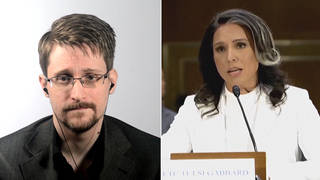
Topics
By Amy Goodman with Denis Moynihan
Tools of mass communication that were once the province of governments and corporations now fit in your pocket. Cell phones can capture video and send it wirelessly to the Internet. People can send eyewitness accounts, photos and videos, with a few keystrokes, to thousands or even millions via social networking sites. As these technologies have developed, so too has the ability to monitor, filter, censor and block them.
A Wall Street Journal report this week claimed that the “Iranian regime has developed, with the assistance of European telecommunications companies, one of the world’s most sophisticated mechanisms for controlling and censoring the Internet, allowing it to examine the content of individual online communications on a massive scale.” The article named Nokia Siemens Networks as the provider of equipment capable of “deep packet inspection.” DPI, according to the Electronic Privacy Information Center, “enables Internet Service Providers to intercept virtually all of their customers’ Internet activity, including Web surfing data, e-mail and peer-to-peer downloads.”
Nokia Siemens has refuted the allegation, saying in a press release that the company “has provided Lawful Intercept capability solely for the monitoring of local voice calls in Iran.” It is this issue, of what is legal, that must be addressed. “Lawful intercept” means that people can be monitored, located and censored. Global standards need to be adopted that protect the freedom to communicate, to dissent.
China has very sophisticated Internet monitoring and censoring capabilities, referred to as “the Great Firewall of China,” which attracted increased attention prior to the 2008 Summer Olympic Games. A document leaked before a U.S. Senate human rights hearing implicated Cisco, a California-based maker of Internet routers, in marketing to the Chinese government to accommodate monitoring and censorship goals. The Chinese government now requires any computer sold there after July 1, 2009, to include software called “Green Dam,” which critics say will further empower the government to monitor Internet use.
Josh Silver, executive director of Free Press, a media policy group, says the actions of Iran and China should alert us to domestic surveillance issues in the U.S. He told me: “This technology that monitors everything that goes through the Internet is something that works, it’s readily available, and there’s no legislation in the United States that prevents the U.S. government from employing it. … It’s widely known that the major carriers, particularly AT&T and Verizon, were being asked by the NSA [National Security Agency], by the Bush administration … to deploy off-the-shelf technology made by some of these companies like Cisco.” The equipment formed the backbone of the “warrantless wiretapping” program.
Thomas Tamm was the Justice Department lawyer who blew the whistle on that program. In 2004, he called The New York Times from a subway pay phone and told reporter Eric Lichtblau about the existence of a secret domestic surveillance program. In 2007, the FBI raided his home and seized three computers and personal files. He still faces possible prosecution.
Tamm told me: “I think I put my country first … our government is still violating the law. I’m convinced … that a lot more Americans have been illegally wiretapped than we know.”
The warrantless wiretapping program was widely considered illegal. After abruptly switching his position in midcampaign, then-Sen. Barack Obama voted along with most in Congress to grant telecom companies like AT&T and Verizon retroactive immunity from prosecution. The New York Times recently reported that the NSA maintains a database called Pinwale, with millions of intercepted e-mail, including some from former President Bill Clinton.
U.S. Attorney General Eric Holder was recently asked by Sen. Russ Feingold if he felt that the original warrantless wiretap program was illegal:
Feingold: “[I]s there any doubt in your mind that the warrantless wiretapping program was illegal?”
Holder: “Well, I think that the warrantless wiretapping program, as it existed at that point, was certainly unwise, in that it was put together without the approval of Congress.”
Feingold: “But I asked you, Mr. Attorney General, not whether it was unwise, but whether you consider it to have been illegal.”
Holder: “The policy was an unwise one.”
Dissenters in Iran and China persist despite repression that is enabled in part by equipment from U.S. and European companies. In the U.S., the Obama administration is following a dangerous path with Bush-era spy programs that should be suspended and prosecuted, not extended and defended.
Amy Goodman is the host of “Democracy Now!,” an independent, daily global TV/radio news hour airing on more than 950 stations in the United States and around the world. She is the author of “Breaking the Sound Barrier,” recently released in paperback and now a New York Times best-seller.
© 2011 Amy Goodman











